新概念第一册Lesson 125--126
新概念英语第一册_第125-126课
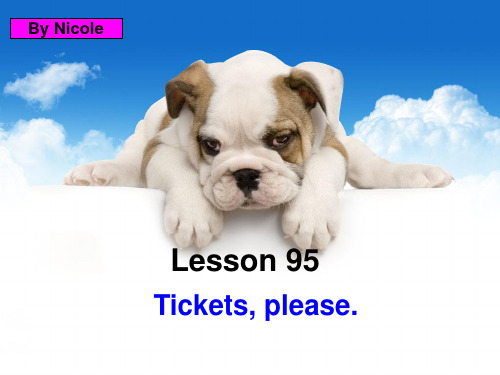
LOGO
Key words&expressions
6. station
1)n. 车站,火车站 a railway station 火车站 a bus station = a bus stop 公共汽车站 你能告诉我往车站怎么走吗? Could you tell me the way to the station? 本次火车将在下一站停留20分钟。 The train will make a 20 minutes’ stop at the next station. 2)(政府机关等的)局,所,中心 a police station 警察局 a fire station 消防队 a gas station 加油站 A power station 电站 a TV station电视台
否定句
Grammars
have to 与must
must 表示主观的认为有必要,有义务 have to 表示含有客观的环境方面的需要, 除了“必须”之外,还有“不得不”。 must 没有时态和人称的变化 I must ,he must have to 有时态和人称的变化 I have to, he has to eg. I must work hard. 我必须努力工作。 (我觉得有必要这么做。) I had to go home by ship last night. 我昨晚不得不乘船回家。 (有可能没有赶上其他的航班或者火车,没选择 才坐船。)
LOGO
Key words&expressions
3. platform
1) n. 站台,月台 an arrival platform 到站站台 a departure platform 出发站台 platform No.2 = platform 2 第二站台 我正在第5站台等你呢。 I’m waiting you at platform 5. 2)n.讲台,讲坛 老师站在讲台上看着学生们。 The teacher is standing on the platform and looking at the students.
新概念英语第一册第125-126课-Tea for two

新概念英语第一册第125-126课:Tea for twoLesson 126 Have to and do not need to不得不和不必要New words and expressions生词和短语immediatelyadv.马上地Lesson 125-126 自学导读First things first课文详注Further notes on the text1.Cant you come in and have tea now, Peter?彼得,你现在能进来喝茶吗?这是否定疑问句,表示邀请。
请参见第77-78课_Terrible toothache语法部分。
2.Dont you remember?你不记得了吗?这也是否定疑问句。
3.dont need to= neednt。
表示“不必”,是must和have to的一般现在时否定式。
4. a pleasant surprise,意想不到的好事,令人惊喜的事。
语法Grammar in usemust, have to和neednt这3个词都表示必要性。
在前面已对must和have to介绍过。
must是情态助动词,而have to是一般动词,二者在确定句中一般可以互换,表示不行躲避的义务或责任。
must更带有说话人的主观颜色,而have to则更强调客观要求和外界影响。
must一般只能表达现在的必要性,而have to则可以表达过去或将来的必要性。
对比例句:Must you go now?你必需现在就走吗?Yes,I have to leave at once.是的,我不得不立刻就走。
Yes,1 must leave at once.是的,我必需立刻就走。
I shall have to leave London tomorrow.我明早得离开伦敦。
I had to stop smoking because it was forbidden in my company.由于我所在的公司内禁止抽烟,所以我不得不停止了吸烟。
新概念英语第一册125-126课课件
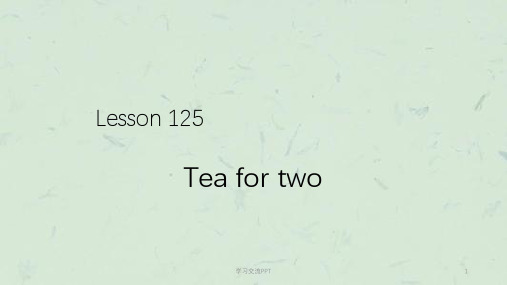
• 你不跟我来么?不,我要跟你去的。
• --Won’t you come with me?
• --Yes, I will.
• water 用作动词,在构词法上属于转化,即词由一个
词性转为另一个词性,词义随之变化。
学习交流PPT
9
• Do you have to water it now? • have to 必须,不得不 • 否定式,疑问式的构成要借助助动词do. • 我必须等他吗?不,不必。 • Do I have to wait for him? • No, you don’t have to. • must 则不需要再借助助动词 • 我必须现在就见他吗? • Must I see him now? • Yes, you must. • No, you needn’t .
• to one’s surprise
• 让我惊讶的是,她已经是两个孩子的妈妈了。
• To my surprise, she was the mother of two children.
• 2)v. 使…惊讶,使…吃惊
• 你总是让我吃惊。
• You always surprise me.
• surprised adj. 吃惊的,感到惊讶的
学习交流PPT
11
• What a nuisance!
• 是对Peter所说的“It’s terribly dry”这句话的评价。
• Last summer it was very dry, too. Don’t you remember? I had to water it every day.源自学习交流PPT10
• I’m afraid I must. Look at it! It’s terribly dry. • I’m afraid 后面可以跟从句作宾语。 • 这事恐怕我做不了。 • I’m afraid I can’t to do this. • 恐怕我又不能及格。 • I’m afraid I’ll fail again. • 恐怕他今天不能回来。 • I’m afraid he can’t be back today.
新概念第一册lesson_125-126

Lesson 125 - lesson 126 Isabella’s teaching plan 110 minutesWord Study• 1. water v. 浇水I went out to water my roses.我出去给我的玫瑰浇水。
v. 喂水water a little dogv. 流口水The dilicious dishes you cooked made my mouth water.你做的美味的菜让我流口水了。
• 2. nuisance n. 讨厌的东西或人【口语】What a nuisance! 真讨厌!• 3. terribly adv.非常,很I feel terribly ill today. 今天我感觉很不舒服。
terrible adj. 可怕的,糟糕的• 4. mean (meant meant) v. 意味着,意思是What do you mean? 你的意思是?mean to do sth. 打算做某事mean doing sth. 意味着…It means / I mean that…意思是…I mean we need to water the garden. 我想说是我们得给花园浇水了。
mean adj. 吝啬的,小气的His uncle is a mean guy. 他的叔叔是个小气鬼。
meaning (n) 意思• 5. dry adj. 干的,干燥的a dry well 一口枯井hair dryer/hair drier 吹风筒/干发器wet adj.湿的,湿润的dry v.擦干dry one's eyes/tears 擦干眼泪• 6. surprise n.惊奇、意外的事What a surprise! 真意外!He gave me a big surprise.Tto one’s surprise 令人惊讶的是do sth. in surprise 惊讶地He looked at me in surprise. 他惊讶地看着我。
新概念英语第一册Lesson-125-126

新概念英语第一册L e s s o n-125-126 -CAL-FENGHAI.-(YICAI)-Company One1Lesson 125-1261. Can’t you come in and have tea now, Peter?否定疑问句可以表示说话者惊讶、责难的口吻或赞扬,也可以表示说话者某种建议、邀请、请求或者看法2. Not yet. I must water the garden first. Not yet. 用于否定句中,表示还。
3. Do you have to water it now have to 不得不Do I have to wait for him Yes, I do. / No, you don’t (have to)Must I see him now Yes, you must. / No, you need’t.4. I’m afraid I must, Look at it! It’s terribly dry.I’m afraid 后面跟从句做宾语,翻译为:恐怕。
5. That was quick! Have you finished alreadyalready 已经经常与完成时态连用,用于肯定句,yet 用于否定句和疑问句Has your brother finished middle school No, not yet. / Yes, he has already finished.6. Yes. Look out of the window. look out of 从……往外看7. It’s raining! That means you don’t need to water the garden.① mean 意味着,意思是说 That means I can never see him again② need to do 需要做某事I’m so thirsty that I need to drink a lot of water.③ don’t need to = don’t have to = needn’t to④ It’s raining heavily! It rains cats and dogs. 倾盆大雨。
Lesson125-126课件新概念英语第一册

must
Peter must water the garden first.
必须 表示说话人主观上的看法
1.含义不同
have to Peter had to water the garden every week.
必须 表示客观的需要,不得不
must
have to
1.I ________ water the garden first. 我必须先给花园浇水。
Lesson 125-126 Tea for two
---
I have a friend who has yellow hair. I have a friend who has long hair. I have a friend who wears green shirt.
Peter
Susan
( ) 3. We __________ stop when the traffic lights are red. A. can B. may C. must D. need
( ) 4. – Must I go to the supermarket? – No, you __________. I have bought something. A. can’t B. mustn’t C. needn’t D. didn’t
一分 二加 三换位
再来看下以how引导的感叹句
What+(a/an)形容词+ 名词 +(主语+谓语)!
可省略
What a great scientist! =What a great scientist he is! What a clever girl! =What a clever girl she is!
新概念英语第一册125-126课课件

He dried his hair with a towel. 他用毛巾把头发擦干。
• 3) vi.变干 • Leave the dishes to dry. • 让碟子变干。
• The paint will dry in two days.
terribly ['terəbli] adv. 非常;可怕地;极度地
I was a terrible fool, you know. 你知道, 我那时是个十足的傻瓜。 My son has suffered ['sʌfə] terribly. He
has lo打击, 失去了最好
• 油漆两天会变干。
• Phrase • dry cleaning n.干洗 • dry weight 干重 • dry land 旱地 • dry skin 干性皮肤
Nuisance ['nju:səns] n.讨厌的人;损害;麻烦事;讨厌
的东西
public nuisance n.妨害公众安宁; 妨害公众利益的人或事物
• You mustn't turn left. • 你不能左转弯。(表示绝对禁止)
情态动词的用法
定义: 情态动词是一种本身有一定的词义,但 要与动词原形及其被动语态一起使用,给 谓语动词增添情态色彩,表示说话人对有 关行为或事物的态度和看法,认为其可能 、应该或必要等。情态动词后面加动词原 形。
• It is cold in the room. They must have turned off the heating.
• 屋里很冷,他们肯定把暖气关了。
• 2. 否定句中用can’t / couldn’t(不可能), may not/might not(可能不)。
新概念第一册 Lesson 125-126
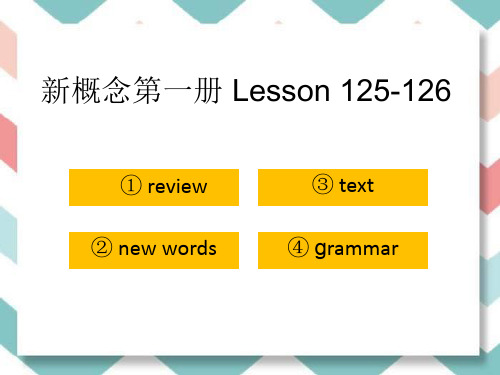
1. water ['wɔ:tə] v.浇水
water the plants/garden 给花草 / 花园浇水
2. terribly ['terəbli] ad.非常
I'm terribly sorry─did I hurt you? 非常抱歉,我伤着您了吗? I miss my mom terribly. 我非常思念他。 拓展:
• 3. dry [drai]
a.干燥的,干的
• 4. nuisance ['nju:səns] n.讨厌的东西或人
• 5. mean [mi:n]
v.意味着,意思是
• 6. surprise [sə'praiz] n.惊奇,意外的事
• 7. immediately [i'mi:diətli] ad.立即地
7. immediately [i'mi:diətli] ad.立即地
• immediately= at once 立即,马上 • They wish to begin immediately after dinner... • 他们希望饭后马上就开始。
new words
• 1. water ['wɔ:tə] v.浇水
MIKE:They're people I met during the trip.
MIKE:That's the ship We travelled on. SCOTT:What a beautiful ship!
listen and check
SCOTT:Who's this? MIKE:That's the man I told you about.
新概念英语第一册 Lesson125-126 (共28张PPT)

(3) dry adj. 干燥的,干的 »e.g. The weather__w_a_s_h_o_t_a_nd__d_r_y_.
天气又干又热。 常用搭配:dry season _旱__季____
»(4) nuisance n. 讨厌的东西或人 e.g. What a nuisance!(课文原句) 常见结构还有:_W_h_a_t_a_p_i_ty_/_s_h_a_m_e_! _
试一试:请根据括号内提示将下列句子翻译成英文
» 1. 我们需要买辆新轿车。 (此处need 为实义动词) __W_e__ne_e_d__to__b_uy__a_n_e_w_c_a_r_. _____
» 2. 你们不必买这么多东西。 (此处need 为情态动词) _Y_o_u_n_e_e_d_n_’t_b_u_y_s_o_m__an_y__th_i_n_gs_.__
to water the garden.
结构:此句中的need 为实义动词,其否定形式要 借助助动词do 来完成, 即don’t need to
语法:need 的用法
1. need 用作情态动词时,表示“需要”,后面直接 跟动词原形,且无人称、数的 变化,常用于疑问句和否定句中。
» e.g. Need I finish my homework now? 我需要现 在完成作业吗?
新概念一
小学英语分院新一组
Lesson125-126
Tea for two
目录
1
Vocabulary
2
Text
3
mmar
Vocabulary
(1) water v. 浇水 猜猜看:waterfall __瀑__布__
新概念英语成人版第一册:L125-126 课件
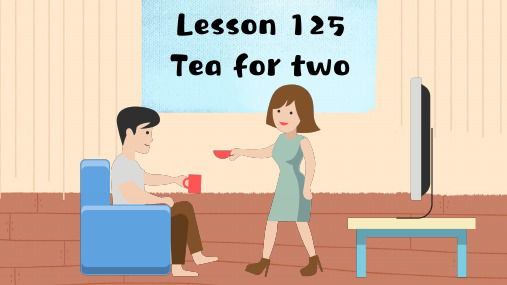
进来 不得不做某事 喝茶 自己一个人 给花园浇水 向窗外看 真讨厌! 不需要做某事
Grammar
must, have to 和 needn't
1) must是情态动词,have to是复合动词 2) must没有时态、人称变化
have to有时态、人称变化 一般现在时: don't/doesn't have to 一般将来时: will (not) have to 一般过去时: didn't have to / had to 现在完成时: have/has (not) had to 3)have to是客观需要,译为“不得不做某事”;
4. ____ hard work it is!
A. How
B. What C. What a
D. How a D. How a
D. How a D. What an
come in have to do sth. have tea by oneself water the garden look out of the window What a nuisance! don't need to do sth.
(物)
surprised adj. 感到吃惊的
(人)
You always surprise me. This is such a surprising thing. I am really surprised. The teacher is surprised at her answer.
water terribly dry mean nuisance surprise
3.模仿例句改写提问 I must go now. Do you really have to go now? 1. I must telephone him. 2. Mary must wait for him. 3. Jim must meet her. 4. Tom and Mary must travel by ship.
新概念一Lesson125-126
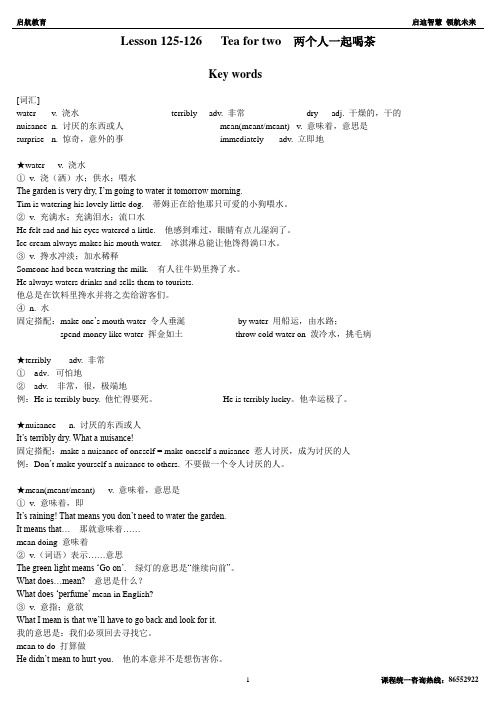
Lesson 125-126 Tea for two 两个人一起喝茶Key words[词汇]water v. 浇水terribly adv. 非常dry adj. 干燥的,干的nuisance n. 讨厌的东西或人mean(meant/meant) v. 意味着,意思是surprise n. 惊奇,意外的事immediately adv. 立即地★water v. 浇水①v. 浇(洒)水;供水;喂水The garden is very dry, I’m going to water it tomorrow morning.Tim is watering his lovely little dog. 蒂姆正在给他那只可爱的小狗喂水。
②v. 充满水;充满泪水;流口水He felt sad and his eyes watered a little. 他感到难过,眼睛有点儿湿润了。
Ice cream always makes his mouth water. 冰淇淋总能让他馋得淌口水。
③v. 搀水冲淡;加水稀释Someone had been watering the milk. 有人往牛奶里搀了水。
He always waters drinks and sells them to tourists.他总是在饮料里搀水并将之卖给游客们。
④n. 水固定搭配:make one’s mouth water 令人垂涎by water 用船运,由水路;spend money like water 挥金如土throw cold water on 泼冷水,挑毛病★terribly adv. 非常① adv. 可怕地②adv. 非常,很,极端地例:He is terribly busy. 他忙得要死。
He is terribly lucky。
他幸运极了。
★nuisance n. 讨厌的东西或人It’s terribly dry. What a nuisance!固定搭配:make a nuisance of oneself = make oneself a nuisance 惹人讨厌,成为讨厌的人例:Don’t make yourself a nuisance to others. 不要做一个令人讨厌的人。
新概念英语第一册第125-126课

LOGO
Key words&expressions
5.mean (meant ; meant)
⑴v. 意思是 What does the word mean? The red light means “stop”.
mean to do sth 打算做... I mean to go tomorrow.
他不大可能是坏人。 在否定、疑问句中表示推测或怀疑。
小结could与can could与can都是情态动词,could是 can的过去式。二者都可用于表示请 求, 但是用法稍有不同。 can表示一般性的请求,语气随便, 常用于熟人之间或长辈对晚辈, 上级 对下级的场合。
用情态动词can, can’t, may, must, mustn’t , needn’t, could 填空。
LOGO
surprise n.惊奇,意外的事
❖ in surprise 惊讶地; 惊奇地
❖ to one’s surprise 使 某人感到惊讶的是
❖ be surprised at sth. 对……感到惊讶
Key words&expressions
6. surprise
⑴ n. 惊喜;惊讶;意外的事 Surprise!
喜欢吃甜食。
It’s not my cup of tea. 我不喜欢,不感兴趣。
LOGO
Can Peter come in and have tea?
Yes, he can.
Key words&expressions
1. water
⑴ vt. 供以水;给…浇水 My grandpa is watering the flowers in the garden.
新概念课堂笔记第一册Lesson125-126

新概念课堂笔记第一册Lesson125-126 Word Studywater【用法】v. 浇水;掺水,流口水n. 水【词组】water the flower 给花浇水pure drinking water 纯洁的饮用水【例句】The plant needs water ing. 这棵植物需要浇水。
Someone watered the milk. 有人往牛奶里掺了水。
Ice cream always ma kes his mouth water. 冰淇淋总能让他馋的流口水。
terribly【用法】adv. 专门,专门糟糕地【扩展】terrible adj. 可怕的,严峻的【例句】I’m terribly sorry. 我专门抱歉。
It’s terribly dry. 它干得厉害。
dry【用法】adj. 干燥的,干的【词组】a dry leaf 一片干树叶be dry with talking 说话说的口干舌燥electric hair drier 电吹风【扩展】drier / dryer n. 吹风机dry-clean v. 干洗dryness n. 干燥;枯燥nuisance【用法】n. 令人厌恶的东西或人【词组】it’s a nuisance doing 做……专门烦人【例句】What a nuisance! 真厌恶!It’s a nuisance having to do so much homework. 做这么多的作业真烦人。
mean【用法】v. 意味着,意思是(m eant –meant)【词组】mean to do sth. 打算做,有意做mean doing sth. 意味着做……【扩展】meaning n. 意思,含义meaningful adj. 有意义的【例句】what do you mean by doing so? 你如此做是什么意思?When I say I mean to do it, I mean it. 我说我要做那件事的时候,我是认确实。
lesson 125-126 新概念一册教师用课件全(吐血制作)

immediately adv. 立刻,马上
Lesson 127 new words
famous adj. 著名的 比较级 more famous 最高级 The most famous
actess 反义词 actor
n. 女演员 n. 男演员
at least
至少
我不是最差的,因为 我至少比他强。
surprise n. 惊喜; 意外v. 使吃惊 真是个惊喜!
What a surprise!
by oneself
独自地,…自己 (我自己)独自 by myself by ourselves 我们自己
当我放学到家时,弟 弟在自己做作业。 When I arrived home, from school, my brother was doing his homework by himself.
Do I have to take the medicine? Yes, you do. No, you don’t.
P.256 Exercise A. 句型转换
c.
I must go now. 主观:我必须走了。 I have to go now. 客观:我不得不走了。
A: I must go now.
Watch Tv.
Listening
He will need to …
否定句:“不必要” He doesn’t need to water the garden. He didn’t need to… He won’t need to…
语法
must与 have to 用法的比较
have to v. 情态动词
必须做… 注意:have 为实意动 词;
nuisancesance he is!
- 1、下载文档前请自行甄别文档内容的完整性,平台不提供额外的编辑、内容补充、找答案等附加服务。
- 2、"仅部分预览"的文档,不可在线预览部分如存在完整性等问题,可反馈申请退款(可完整预览的文档不适用该条件!)。
- 3、如文档侵犯您的权益,请联系客服反馈,我们会尽快为您处理(人工客服工作时间:9:00-18:30)。
Lesson 125—126
一、填写单词所缺字母
W__ter s__ __pr__se n__ __s__nce m__an t__rr_bly
Fin__sh pl_ __ s__nt g__ __den r__m__mber __mm__di__tely
一、句型转换
1.I have to do my homework now.(改为一般疑问句)
2.we have to walk to the station. (改为否定句)
3.How has to wait for three days. (就划线部分提问)
4.Look out of the window.(改为否定句)
5.This is the film . I saw it yesterday.(将两个句子用that合并成一个句子)
二、单项选择
1._____you _____go now ?
A. Do, have to
B. Have,to
C. Have ,X
D. Do , had to
2. Did you have to take a taxi ? I am afraid________
A. had
B. had to
C. have
D. have to
3. Don’t look ____the window.
A. out
B. out in
C. up of
D. out of
4. Hasn’t your teacher arrived _______?
A. already
B. still
C. yet
D.too
5. I will have to wait _____
A. by me
B. by myself
C. in me
D. in myself
6. They are the thieves ______the police caought.
A. whom
B. whose
C. which
D. when
7. _____she _____telephone him this evening.
A. Does, has to
B. Does, have to
C. Has ,to D .Have,to
8. They often travel _____.
A. by the train
B. by the plane
C. by plane d. by the ship
9. –Do you have to walk to station ?
--No, we don’t _____
A. need to
B. need
C. needed to
D. needed
10.This is the film ______he told me about .
A. which
B. whom
C. who
D. what
五、汉译英
1. 这就是说,你不必给花园浇水了
2. 你看看,干得多厉害
3. 我们每天都得上学去.
4. 你不得不走上去车站吗?,不,我不必要.
6.明天早晨我不得不六点起床.
7.你不得不浇花园吗?不,我不需要现在浇.
8.进来喝茶 9.好讨厌。
